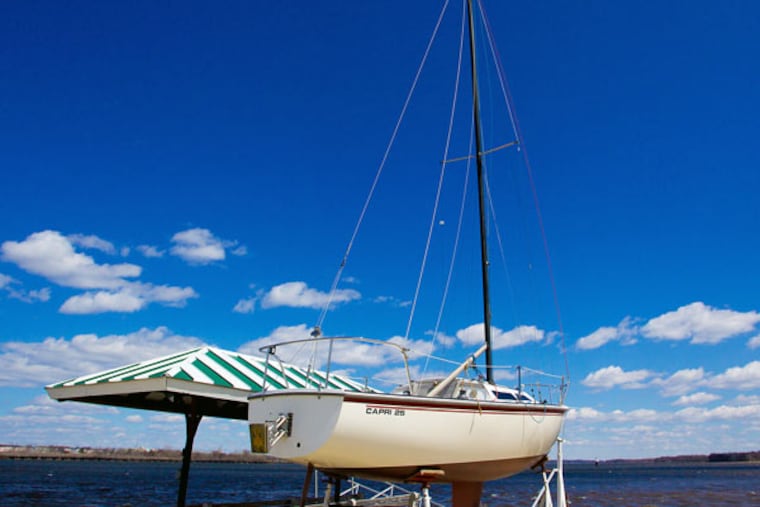Riverton Yacht Club's toast to spring
Two dozen members of the Riverton Yacht Club filed through the tall metal gate early Saturday morning and lumbered groggily toward the clubhouse.

Two dozen members of the Riverton Yacht Club filed through the tall metal gate early Saturday morning and lumbered groggily toward the clubhouse.
They could hardly hear one another's hellos over the wind's ragged breath, whitecaps slapping rocks, and plastic tarps complaining loudly, trying to break loose from the bungee cords strapping them to boats in dry dock.
On either side of the pier, where the small but mighty sailing club has made its home for 150 years, the last stubborn patches of sooty snow had finally receded, leaving a crusty coating of moss crosshatched with broken tree twigs on the banks of the Delaware River.
It was spring. Time for the annual ritual of lugging, hoisting, and ah-at-long-blithering-last lowering the 12 club docks into the Delaware.
But the members of this club are a humble lot. Humble, and seasoned enough to know that no plan goes forward without consent from the elements.
By 9 a.m., with the job half done, they gave up.
"We might come back tonight if the wind lies down," said John Mangan, the club's treasurer and longtime member. The prospects, however, seemed dim, so he expected to have to ask volunteers to come back one day this week to put the last three docks into the water.
The rest of the day's activities had to be scaled back too.
Barb Smyth had been home, making chili for the communal lunch, when she got a call telling her to turn off the flame. Everyone would probably be going home before lunch.
"Ah well," she shrugged. "Now I have dinner made."
A semiretired teacher, Smyth, 62, began sailing with the club as a little girl. In the 1930s, her grandfather served as "commodore," the club's chief officer. Her parents met and fell in love at the club, and so did she and her husband.
"When I was growing up, women weren't as interested in sailing," she said. "My mother was an exception."
Breaking tradition in what had long been a man's sport, her mother skippered a boat, Smyth said.
In 2006, Smyth became the club's first woman commodore. Last year, Mary Keppel, another longtime member, became the second.
"There's something about the simplicity of sailing," Smyth said. "You're relying on yourself. Out in the weather. Away from the television and electronics.
On Wednesday nights throughout the spring and summer, when the club holds races drawing 50 to 70 boats at a time, Smyth said, she often looks out at the cars clotting the Tacony-Palmyra Bridge, only a few miles away, and reminds herself how lucky she is to be out on her boat.
Her friends nodded. Yes. It is peaceful.
And also, one of her fellow sailors noted, "after the races, there is beer."
As he spoke, Smyth's husband, Glenn, called up from the pier below. "It's time for the burning of the socks!"
The volunteers descended the wooden stairs and gathered outside around a firepit where a few logs burned smokily.
"I'm going to tell you the story of this tradition," Smyth announced, shouting over the wind that had grown more rowdy by the hour.
Back in some old, but undetermined, era, sailors would wear the same pair of socks all winter, he said. By spring, no amount of laundering would restore them to utility, let alone public health standards. To welcome the spring, the men would gather, peel off the socks, and send them to a fiery grave.
To complete his extensive research on the subject, Smyth said, "I Googled!" and discovered that the tradition was revived in the 1970s by a boatyard owner from Annapolis, who invited his friends to burn their socks and toast the end of the winter with a few cold beers.
With that, Smyth pulled a fistful of clean but worn tube socks from his pocket and dropped them on top of the burning logs.
"Your turn!" he said, inviting the circle of friends to do the same. Then raising a bottle of Miller Lite, he said: "Here's to spring!"